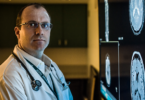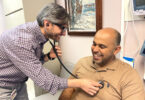The COVID-19 pandemic has impacted all of us, but it has been particularly challenging for older adults. Dr. Mireille Norris, a geriatrician at Sunnybrook, has seen some concerning trends in the last year, and she offered insight into the challenges, as well as suggestions for how older adults can care for their health and well-being more than a year into the pandemic.
Increase in trauma consults during COVID-19
While many older adults have been battling the effects of increased isolation during the pandemic, Dr. Norris has seen a “tragic” development for some in the kind of trauma consults she is providing in Sunnybrook’s emergency department.
“What has struck me is the increased consults that reflect violence affecting seniors, either self-harming or they’ve been [harmed] by a family member. I’ve never seen that in 16 years at Sunnybrook, and this is really, for me, a signal,” she says. “I believe what I’m seeing on the trauma consult is a reflection of senior distress.”
For patients with dementia, especially if they haven’t seen their family doctor or specialist regularly throughout the pandemic, their condition can deteriorate to the point where they are harming themselves. Some of the violence could also be a result of caregivers who are stressed and burnt out from caring for their loved ones at home.
Don’t put off calling the doctor
Dr. Norris says another concerning trend during the pandemic has been older adults who delay getting health care.
“It was already normal [that] seniors tend to under report their symptoms and delay going to the doctor,” she says, adding they often blame ailments on aging. This mindset has become more problematic during the pandemic because it has increased the chances of older adults delaying care because they are concerned about crowded hospitals, or nervous about leaving their home for fear of contracting the virus.
Dr. Norris says it’s a “recipe for disaster,” and that hospitals and doctors’ offices are safe and open to provide care.
“One year into the pandemic, we’ve really developed fantastic ways to mitigate the challenges and we’ve gotten really good at virtual care and at hybrid models.”
Mental and physical health go hand-in-hand
For those older adults in the community who are not experiencing trauma, but are still struggling to manage their mental health and well-being in the pandemic, Dr. Norris says it’s important to remember mental and physical health are connected.
“Being well is a mind, spirit, body affair,” she says.
So while finding ways to socialize safely, whether it’s church over Zoom or visits with grandchildren while following Public Health guidelines, is important for mental health and can be “uplifting” for older adults, it’s also necessary that older adults are caring for themselves physically as well.
“We have to get back to basics: sleep, nutrition, exercise,” she says. “It could just be easy walks. And it’s better to do something than nothing. Even people who are frail, I will tell them: walk five minutes, three times a day after every meal.”
And, of course, physical health means contacting your family doctor if you are experiencing concerning symptoms. Dr. Norris says that could be falling, unexplained weight loss, forgetfulness or new and different pain.
If you need help in an emergency, please call 911 or visit your local emergency department.
If you’re feeling like you’re in crisis or need somebody to talk to, please know that help is also available through community resources:
- Find a local crisis resource at ca/gethelp
- Crisis Services Canada
- Phone: 24-hour, toll-free 1-833-456-4566
- Text:45645 (4:00 p.m. – midnight Eastern Time)








